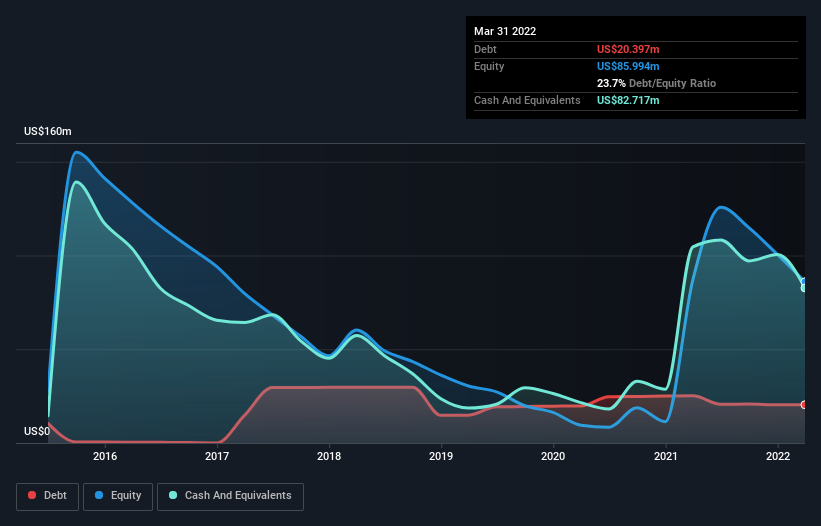Rock star Growth Puts Conformis (NASDAQ:CFMS) In A Position To Use Debt
Legendary fund manager Li Lu (who Charlie Munger backed) once said, 'The biggest investment risk is not the volatility of prices, but whether you will suffer a permanent loss of capital.' It's only natural to consider a company's balance sheet when you examine how risky it is, since debt is often involved when a business collapses. As with many other companies Conformis, Inc. (NASDAQ:CFMS) makes use of debt. But the more important question is: how much risk is that debt creating?
What Risk Does Debt Bring?
Debt and other liabilities become risky for a business when it cannot easily fulfill those obligations, either with free cash flow or by raising capital at an attractive price. If things get really bad, the lenders can take control of the business. However, a more frequent (but still costly) occurrence is where a company must issue shares at bargain-basement prices, permanently diluting shareholders, just to shore up its balance sheet. By replacing dilution, though, debt can be an extremely good tool for businesses that need capital to invest in growth at high rates of return. The first step when considering a company's debt levels is to consider its cash and debt together.
View our latest analysis for Conformis
How Much Debt Does Conformis Carry?
You can click the graphic below for the historical numbers, but it shows that Conformis had US$20.4m of debt in March 2022, down from US$25.2m, one year before. But on the other hand it also has US$82.7m in cash, leading to a US$62.3m net cash position.
How Strong Is Conformis' Balance Sheet?
The latest balance sheet data shows that Conformis had liabilities of US$16.2m due within a year, and liabilities of US$26.5m falling due after that. On the other hand, it had cash of US$82.7m and US$10.8m worth of receivables due within a year. So it can boast US$50.7m more liquid assets than total liabilities.
This surplus liquidity suggests that Conformis' balance sheet could take a hit just as well as Homer Simpson's head can take a punch. Having regard to this fact, we think its balance sheet is as strong as an ox. Succinctly put, Conformis boasts net cash, so it's fair to say it does not have a heavy debt load! There's no doubt that we learn most about debt from the balance sheet. But it is future earnings, more than anything, that will determine Conformis's ability to maintain a healthy balance sheet going forward. So if you want to see what the professionals think, you might find this free report on analyst profit forecasts to be interesting.
Over 12 months, Conformis reported revenue of US$102m, which is a gain of 54%, although it did not report any earnings before interest and tax. Shareholders probably have their fingers crossed that it can grow its way to profits.
So How Risky Is Conformis?
We have no doubt that loss making companies are, in general, riskier than profitable ones. And we do note that Conformis had an earnings before interest and tax (EBIT) loss, over the last year. And over the same period it saw negative free cash outflow of US$20m and booked a US$6.9m accounting loss. But the saving grace is the US$62.3m on the balance sheet. That kitty means the company can keep spending for growth for at least two years, at current rates. With very solid revenue growth in the last year, Conformis may be on a path to profitability. By investing before those profits, shareholders take on more risk in the hope of bigger rewards. The balance sheet is clearly the area to focus on when you are analysing debt. However, not all investment risk resides within the balance sheet - far from it. These risks can be hard to spot. Every company has them, and we've spotted 4 warning signs for Conformis (of which 1 is potentially serious!) you should know about.
Of course, if you're the type of investor who prefers buying stocks without the burden of debt, then don't hesitate to discover our exclusive list of net cash growth stocks, today.
Have feedback on this article? Concerned about the content? Get in touch with us directly. Alternatively, email editorial-team (at) simplywallst.com.
This article by Simply Wall St is general in nature. We provide commentary based on historical data and analyst forecasts only using an unbiased methodology and our articles are not intended to be financial advice. It does not constitute a recommendation to buy or sell any stock, and does not take account of your objectives, or your financial situation. We aim to bring you long-term focused analysis driven by fundamental data. Note that our analysis may not factor in the latest price-sensitive company announcements or qualitative material. Simply Wall St has no position in any stocks mentioned.

